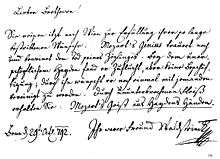Count Ferdinand Ernst Gabriel von Waldstein

Count Ferdinand Ernst Joseph Gabriel von Waldstein und Wartenberg (24 March 1762 – 26 May 1823) was a German nobleman and patron of the arts. A member of the Bohemian House of Waldstein and an early patron of Ludwig van Beethoven, his political and military roles included the office of a Geheimrat in Bonn, lieutenant-general in the British army, and commander (Komtur) of the Teutonic Order.
Life
Waldstein was born in Vienna, Austria, the son of Count Emanuel Philibert von Waldstein (1731–1775) and his wife Maria Anna Theresa of Liechtenstein. He was the younger brother of Franz de Paula Adam von Waldstein.
In 1787 he joined the Teutonic Knights and became a novice in Ellingen. Living in Bonn from early 1788 onwards, Waldstein received, on 17 June that year, the knighthood of the Order by its Grand Master Archduke Maximilian Francis of Austria, the Elector of Cologne. He was admitted to electoral court in Bonn and one year later became Geheimrat ("privy councillor") of the Order and a member of its Staatskonferenz . Two years later, he acquired a knightly estate in Godesberg and thus became a member of the Cologne Landstandschaft.
From 1788 to 1792, Ferdinand was sent on various diplomatic missions. In 1792, he received the Komtur office of the Order at Virnsberg Castle in Franconia. By early 1794, he was in the entourage of Elector Maximilian Francis, who had fled to Vienna from the invading French forces during the War of the First Coalition.
He became obsessed with the idea of defeating the French, broke up with the Elector and squandered all his money raising an army.[1] On 3 June 1795, Ferdinand sealed a contract with England on creating a "Mergentheim regiment". From 1796, he was in London. On 23 July 1797, Maximilian Francis wrote, "For over a year neither the order nor his creditors have heard anything from Ferdinand von Waldstein, I wish him much money and intelligence". Evidence shows Ferdinand was occasionally with his regiment in the West Indies. In 1807, he left the British army.
From 1809, Ferdinand lived in Vienna or on his Bohemian estates. He withdrew from the Order in 1811. On 9 May 1812, Ferdinand married the wealthy Countess Isabella Rzewuska and organised numerous festivities on the sidelines of the Vienna Congress. After several unfortunate financial transactions, however, he became impoverished, and died in 1823 in Vienna.
Patron

Waldstein, a fairly good pianist and composer, took an active part in the public life of Bonn. In the literary circles of professor Eulogius Schneider he noticed the young Ludwig van Beethoven around 1790 and he became one of his early patrons. In 1791/92 Beethoven finished a score Eight variations for piano four hands on a theme by Count Waldstein.
It was Waldstein who recommended young Beethoven to Joseph Haydn[2] and arranged a scholarship for him. His entry in Beethoven's friendship book on the composer's departure for Vienna in November 1792 remain famous:
| “ | Dear Beethoven! You go to realise a long-desired wish : the genius of Mozart is still in mourning and weeps for the death of its disciple. (...) By incessant application, receive Mozart's spirit from Haydn's hands. | ” |
In 1804 Beethoven dedicated his Sonata No. 21 in C Major, Op.53, known as the Waldstein, to him.[3] However, it seems that both men hardly had contact with one another at that time.
Notes
- ↑ Suchet, "Beethoven's patrons - Count Waldstein."
- ↑ http://www.madaboutbeethoven.com/pages/people_and_places/people_patrons/people_patrons_waldstein.htm
- ↑ Mintz, 188.
Sources
- Beach, David; Donald Mintz; Robert Palmer (Winter 1969). "Analysis Symposium: Beethoven: Sonata, Op. 53". Journal of Music Theory. 13 (2): 186–217. doi:10.2307/842986. JSTOR 842986.
- Suchet, John. "Beethoven's patrons - Count Waldstein". Retrieved 21 April 2007.